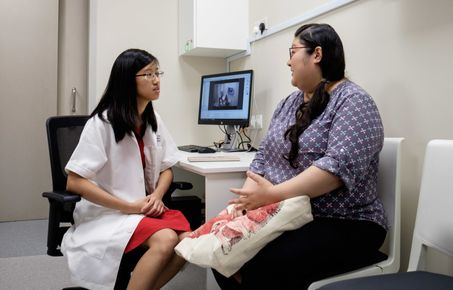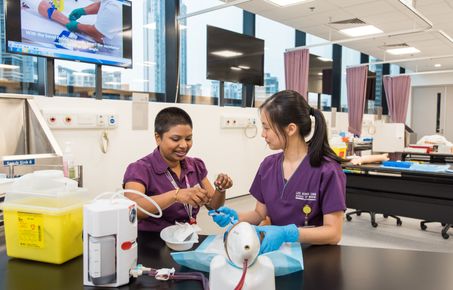The process began in October 2010, shortly after the signing of the Imperial-NTU Collaboration Agreement, and involved a comprehensive review of Imperial’s MBBS curriculum, international medical curricula, and assessment of local needs in Singapore.
This resulted in a bespoke, innovative programme combining many elements of Imperial’s MBBS programme; enhanced and contextualised for Singapore. Students gain experience in a wide range of clinical settings from an early stage in the course and use the very latest learning technology, including South East Asia’s first Anatomage Table which displays life-sized 3D images of full body anatomy. The academic team in the London Office of LKCMedicine retains oversight of ongoing curriculum development as the School grows in size and prominence.
LKCMedicine’s curriculum aims to lay a firm foundation in the basic medical sciences while providing students with a high-quality clinical experience. The curriculum emphasises the clinical relevance of the basic sciences and students have patient exposure from the beginning of the programme. The programme content is designed around three primary domains that run throughout the programme:
Primary domains
Scientific Basis of Medicine
This theme includes the basic sciences underpinning human structure and function in health and disease, scientific enquiry (the principles underlying research and evidence-based medicine), population health, social and behavioural science, pharmacology and technology in Medicine.
Clinical Management and Patient-Centred Care
An overarching theme throughout the course is that of enhancing patient care through the acquisition of clinical skills, interpretation of clinical findings and clinical management. It includes shared decision-making and effective communication, including medical language/dialect skills (Malay, Mandarin and Hokkien, as appropriate).
Healthcare Delivery and Professional Standards
This theme includes ethics, law and professionalism, organisation of care, health service policy, and organisation and professional development.
Our pedagogy: Team-based learning (TBL)
LKCMedicine is the first undergraduate school to completely replace lectures as the primary classroom teaching method for large groups. Its curriculum a is designed to optimise student training using the core principles of critical engagement, team learning and application of knowledge. The LKCMedicine programme was designed using the world class Imperial MBBS curriculum as a template. For information about how we use TBL in LKCMedicine visit here.
LKCMedicine students learn in several innovative ways. Teamwork, communication skills and ethical decision making are emphasised throughout and teaching features the following approaches:
Pedagogy

Use of e-Learning
E-Learning tools are widely used in LKCMedicine and all students are issued with an iPad. To aid mobility between two campuses, hospitals and polyclinics, the learning materials such as voice-over powerpoints, course learning outcomes, timetables, and RAP questions are available online. An ePortfolio is also be used to support professional development, feedback, reflection and assessment.

Use of simulation
Simulation enables students to develop and refine their clinical skills. Simulated patients are trained to role-play and give students patient-focused feedback. Hybrid simulation allows students to practise clinical skills in context to support the integration of technical, communication, patient safety, professionalism and other non-technical skills. Sequential simulation is used extensively to help students understand the whole process of care necessary for optimal patient outcomes.

Clinical training
The LKCMedicine curriculum places an emphasis on patient-centred care and an early exposure to real clinical care conditions. To facilitate this, the School works closely with a wide range of Singapore’s healthcare providers. Students are exposed to the whole pathway of care, have earlier and more extensive exposure to patients and clinical environments than in most traditional medical programmes, and learn from the best clinicians local and overseas. A key highlight in clinical training is the Long-Term Patient Project in Years 1 and 2 that gives students a more realistic view of disease progression and the effect on patients.
Collaborative Partnerships Office Privacy Notice
Click here to view our Privacy Notice
If you have any questions, please contact the Data Protection team.
